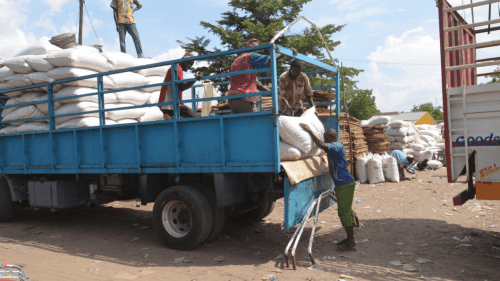The Federal Government has uncovered a sinister plot by neighbouring Benin Republic to dump 105,000 metric tonnes of foreign rice worth $30 million (N10.8 billion) in Nigeria ahead of the yuletide season.
Minister of Information and Culture, Alhaji Lai Mohammed, raised the alarm on Monday while addressing a press conference along with Minister of Foreign Affairs Geoffrey Onyeama; Minister of Interior, Rauf Aregbesola; Minister of State for Finance, Budget and National Planning, Clement Agba; National Security Adviser (NSA), Maj. Gen. Babagana Monguno (rtd) and the Comptroller General of the Nigerian Immigration Service (NIS), Muhammed Babandede, when they visited the border outpost in Seme.
Earlier this month, the Comptroller General of Customs, Hameed Ali, had raised the same alarm when he expressed concern over a $32 million rice grant offered to the Republic of Benin by Japan.
Mohammed said the government had discovered that presently there were ships berthing in Benin waters and loaded with foreign rice, which would be smuggled into Nigeria for the Christmas period.
The minister listed the loaded ships and their contents as MV Africana Jacana , 40,000 mt; MV Zilos, 20,000 mt and MV Sam Jarguar 45,000 mt.
He said it was clear that the destination of the rice was Nigeria given that the shipment was beyond what could be consumed by the Benin population of less than 25 million people.
The minister excoriated Benin of concluding arrangements to import rice valued at $30 million from Japan.
He also said the federal government had discovered that over time both Benin and Niger had been circumventing the ECOWAS protocol on transit, which requires that when a transit container berths at a seaport, the receiving country is mandated to escort same without tampering with the seal to the border of the destination country.
“Unfortunately, experience has shown that our neigbours do not comply with this protocol. Rather, they break the seals of containers at their ports and trans-load goods meant for Nigeria,” he added.
The minister accused both Niger and Benin Republic of not doing enough to ameliorate the challenges that led to the border closure three months ago.
He said the border closure would not have occurred if Nigeria’s neighbours had complied with the various MoUs as well as the ECOWAS transit protocols, including the ECOWAS Trade Liberalisation Scheme (ETLS).
”Discussions on doing legitimate trade between Nigeria on one hand and Benin and Niger on the other, started in 2005. The discussions have led to MoUs in 2005, 2014, 2015, 2016, 2017 and 2018, all designed to facilitating free movement of goods manufactured in their respective countries and work out the modalities through the Ministers of Trade of both countries for the realisation of this objectives.
”It is worth noting that there has never been legitimate transit trade between Nigeria and the two countries (Benin and Niger). For clarity, the ECOWAS protocol on transit demands that when a transit container berths at a seaport, the receiving country is mandated to escort same without tampering with the seal to the border of the destination country. Unfortunately, experience has shown that our neighbours do not comply with this protocol,” he stated.
He defended the closure of the borders, saying terrorists and kidnappers were capitalising on the porous borders to smuggle in arms and illicit drugs into the country.
The minister said 95 per cent of the illicit drugs and weapons being used to perpetrate terrorism and kidnapping in Nigeria arrived through its porous borders.
He said the ongoing Operation Swift Exercise and border closure effected by government had led to arrests and seizure of goods worth N3.5 billion.
He put the number of illegal immigrants that had been arrested at 296 while some items seized included 38,743 bags of parboiled foreign rice; 514 vehicles; 1,012 drums filled with petrol; 5,400 jerrycans of vegetable oil; 346 motorcycles; 10, 553 jerrycans of petrol and 136 bags of NPK fertiliser used for making explosives.
He, however, said since this partial closure, the acts had drastically subsided.
“The partial closure has also curbed the smuggling of foreign rice into the country, in addition to other prohibited items. Our series of interactions and engagements with Rice Miller Association of Nigeria since the commencement of this exercise has shown that the border closure has enhanced more production and milling of Nigerian rice. “Patronage of Nigerian rice has increased and farmers are expanding their farms as well as engaging more hands. “Furthermore, the border closure has impacted positively on revenue generation of the federal government, which in turn will be used to build more infrastructure and develop critical sectors of the nation’s economy. The border exercise has also curbed diversion of petroleum products from Nigeria to neighbouring countries,” Mohammed said.
